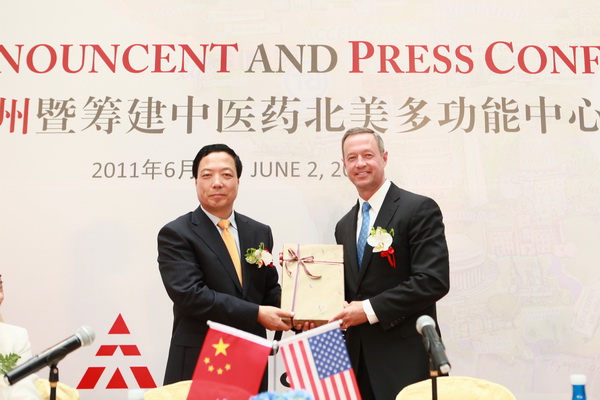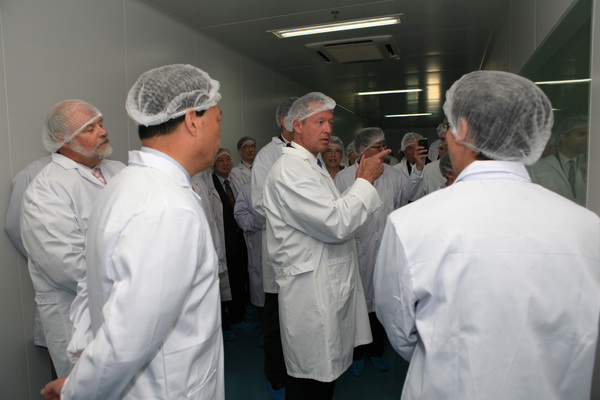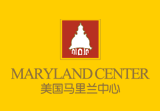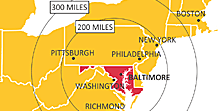SHANGHAI, CHINA (June 2, 2011) – On the first full day of a 10-day economic development mission to Asia, Maryland Governor Martin O’Malley today announced that Tasly Group, one of China’s leading biopharmaceutical companies, will invest $40 million in a new U.S. operation in Montgomery County, marking the largest investment in Maryland by a Chinese company. The company plans to open a 430,000-square-foot production facility and training center for traditional Chinese medicine in the Shady Grove Life Sciences Center. They selected Maryland to leverage the vast bioscience resources nearby as they prepare for Phase III clinical trials of their traditional Chinese medicine product Compound Danshen Dripping Pills (CDDP) developed to treat and prevent coronary disease. In making the announcement at Zhangjiang High-Tech Park , China’s “Pharma Valley”, the Governor was joined by Tasly Chairman Dr. Yan Xijun.
“We are here in China to highlight the incredible opportunities there are for Maryland companies to collaborate with Chinese investors and researchers,” said Governor O’Malley. “By reaching across borders, we can share knowledge and research, generate promising partnerships, and leverage the power of innovation to create jobs and expand opportunity to make our children winners in this changing, global economy. We are pleased to welcome Chinese companies to Maryland.”
“We were looking for a place with the best talent, research and development infrastructure and geographic location in the U.S. and Maryland, with its rich scientific community and world-class universities is the perfect fit for us,” said Tasly Chairman Yan. “We think there is an incredible opportunity for Tasly to innovate new products and introduce them to the US market. This also marks an important chapter in the globalization of traditional Chinese medicine.”
“By locating in the Shady Grove Life Sciences Center, which over the coming years will be transformed into a thriving, mixed-use biotech hub via the Great Senenca Science Corridor Plan, Tasly will be well-positioned to establish research and development collaborations with renowned research institution Johns Hopkins University, and the many other premiere biotech companies and health partners located there,” said Montgomery County, Maryland County Executive Isiah Leggett. “Montgomery County, Maryland welcomes Tasly to our diverse biotech community and we look forward to supporting their long-term growth and success here.”
“We look forward to developing a close partnership in research and education with Tasly,” said Johns Hopkins Vice Provost for International Programs Pamela Cranston, who is a member of the Asia mission delegation. “Tasly’s establishment in the Shady Grove Life Sciences Center will be a great addition to our scientific community in Maryland, and especially to Montgomery County.”
As part of its long-range goals, Tasly plans to build a world-class bio-pharmaceutical base, unite top international biomedical experts, develop and produce biomedicine, and provide high quality products for the U.S. and European markets at its Maryland facility. The company will collaborate with more than 100 clinical centers worldwide and enlists the participation of more than 2,000 patients. Tasly’s goal is to make CDDP the first traditional Chinese medicine product to launch as an FDA-approved pharmaceutical in the American market and could be on the shelves as early as 2014 if the phase III trials prove to be successful. Annually, more than 10 million patients can benefit from this traditional Chinese medicine to treat coronary diseases and angina.
Governor O’Malley made the announcement following a keynote address at the 13th Shanghai BioForum, which attracted more than 500 global attendees and is one of China’s premier biopharmaceutical events. As part of his visit to Tasly, the Governor and members of the delegation also toured the Tasly’s Shanghai headquarters in Zhangjiang High-Tech Park, Pudong, which features China's largest cell culture base. Following the meeting with Tasly executives, the Governor had lunch with executives of some of China’s largest biopharmaceutical companies.
Tasly is the latest foreign-owned company to invest in Maryland. Since 2007, Maryland has attracted more than 40 foreign-owned companies from high-growth countries, including China, Brazil, Korea, Russia, India, Sweden and the United Kingdom, with about one-quarter of these companies locating in Maryland’s International Incubator at the University of Maryland College Park.
Maryland has long maintained a strong presence in China, becoming the first U.S. state in 1996 to open a trade and investment office in China – the Maryland China Center. In 2010, China was Maryland’s 3rd largest export market with $571 million in goods and services, and was the State’s 2nd largest import market, with more than $2.6 billion. There are 14 Chinese headquartered companies in Maryland, including U.S. Orchids, an orchid propagation company in Somerset County; Electrical Systems Integrator, an electric tools developer and supplier to Stanley Black and Decker in Baltimore County; and Yisheng U.S. BIOPHARMA, a biopharmaceutical company in Montgomery County. In addition, there are eight Chinese companies in Maryland’s International Incubator at University of Maryland, College Park. Maryland is also home to several Chinese organizations, including the Chinese Biopharmaceutical Association and the Maryland China Business Council.
Maryland is well-positioned for growth in the global market, with more than 300 foreign-owned companies from 30 countries currently calling Maryland home. Roughly 105,000 Marylanders, or 3.5 percent of the workforce, are employed by foreign-owned firms, with companies headquartered in the Netherlands, United Kingdom and Germany as the top three foreign employers in Maryland.
Maryland’s Office of International Investment and Trade works to stimulate foreign direct investment in the State, offers export assistance for small and mid-sized Maryland companies and coordinates international trade and investment missions and trade show opportunities for Maryland companies. For more information on resources available to business that want to market their products or services globally, visit www.choosemaryland.org
Background information:
About The State of Maryland
Maryland is strategically located on the Atlantic Seaboard, close to Washington DC, the nation's
capital. The capital city is Annapolis and Baltimore is the state's only independent city, which also happens to be the largest. Baltimore is only 50 miles north of Washington, DC and the Washington‐Baltimore Metropolitan Area. The greater metro area constitutes roughly 90% of Maryland's population, is one of the wealthiest areas in the nation, ranking 4th in both effective buying income and retail sales, which are $199 billion and $123 billion respectively in 2008.
Maryland ranks third in the 2010 State New Economy Index. The Gross State Product of Maryland reached $283.8 billion in 2009. With a median household income of $69,272 in 2009, Maryland households are currently the wealthiest in the country. Maryland is home to one of the five largest biotechnology industry clusters in the world and the site of FDA and NIH.
Maryland has outstanding education resources, including 11 campuses of the University System of Maryland, as well as the Johns Hopkins University, which has particular strengths in information sciences and biotechnology. These institutions have created over 250 research centers and institutes in science and technology.
The Baltimore Washington International Airport consistently ranked as one of the best in the country; and both Reagan National and Dulles Airports within 30 kilometers of the State’s border. Port of Baltimore is the farthest inland major port of the East Coast U.S. Maryland is also the intersection of the two major interstate highways of the East Coast U.S.: I‐95 (North/South) and I‐70(East/West).
About Tasly Group
Tasly was founded in May 1994. Through decades of development, Tasly’s scope of business now includes modern traditional Chinese medicine (TCM), chemical medicine, biological medicine, healthcare products, and nutritional products, with the company actively engaged in research and development, manufacturing, and distribution.
Tasly has made constant efforts to promote innovative scientific research and constant self-improvement in order to build up core competitiveness. The company’s modern TCM system has taken shape step by step, and is now composed of anti-virus medicines, anti-flu medicines, cardiovascular medicines, cerebrovascular medicines, anti-tumor medicines, immune system medicines, and digestive system medicines. Tasly’s Cardiotonic Pill, Nourishing Blood & Cleaning Brain Granule, and Chuanxinlian Lactone Dripping Pill have all became well known in the Chinese market. Sales of Cardiotonic Pill have exceeded 1 billion RMB for four consecutive years, making it the most popular single Chinese medicine product by revenue.
In 2004, Tasly was awarded as an 'excellent enterprise of intellectual property rights protection'. By the end of 2006, Tasly had applied for 599 patents and 22 international PCT patents. In recent years, Tasly's internationalization strategy has kicked into high gear; key regional markets have taken shape in Southeast Asia, Europe, North America, and Africa. Tasly has registered pharmaceutical products in 34 countries and regions, and Cardiotonic Pill has undergone FDA and EMEA Phase II and Phase III clinical trials.
Tasly has already set up a national technological center for enterprises and a national postdoctoral scientific research station, and has also taken on more than 40 key national scientific research programs. Tasly Modern TCM Garden is listed as an ‘exemplary project of national hi-tech industrialization’.
About Johns Hopkins University
After 135 years, Johns Hopkins remains a world leader in both teaching and research. Eminent professors mentor top students in medicine, nursing, public health, the arts and music, the humanities, the social and natural sciences, engineering, international studies, education, and business. Those same faculty members, and their research colleagues at the university's Applied Physics Laboratory, have each year since 1979 won Johns Hopkins more federal research and development funding than any other university.
The university comprises nine academic divisions and has campuses throughout the Baltimore-Washington area. The Krieger School of Arts and Sciences, the Whiting School of Engineering and the School of Education are based at the Homewood campus in northern Baltimore. The schools of Medicine, Public Health, and Nursing share a campus in east Baltimore with The Johns Hopkins Hospital. The Peabody Institute, a leading professional school of music, is located on Mount Vernon Place in downtown Baltimore, and the Carey Business School is based in the city’s Harbor East section. The Paul H. Nitze School of Advanced International Studies is located in Washington's Dupont Circle area.
The Applied Physics Laboratory is a division of the university co-equal to the nine schools, but with a non-academic, research-based mission. APL, located between Baltimore and Washington, supports national security and also pursues space science, exploration of the Solar System and other civilian research and development.
Johns Hopkins also has two campuses in Montgomery County, Md., and has academic facilities in Nanjing, China, and in Bologna, Italy. It maintains a network of continuing education facilities throughout the Baltimore-Washington region, including centers in downtown Baltimore, downtown Washington, and Columbia.
When considered in partnership with its sister institution, the Johns Hopkins Hospital and Health System, the university is Maryland's largest employer and contributes more than $10 billion a year to the state's economy.
About Montgomery County, Maryland
Centrally located in the region’s federal and advanced technology marketplace, Montgomery County, Maryland is the gateway to the mid-Atlantic’s robust business community. Bordering Washington, D.C., the County is home to over 330 biotech companies, including industry leaders such as Human Genome Sciences, MedImmune, QIAGEN, and United Therapeutics. Nineteen federal facilities are located here including the National Institutes of Health, the National Institute of Standards and Technology and the Food and Drug Administration. In addition, the county is home to premiere educational and research organizations such as The Johns Hopkins University’s Montgomery County Campus, the Howard Hughes Medical Institute, the Henry M. Jackson Foundation and the Universities at Shady Grove. Corporate leaders including BAE Systems Applied Technologies, Discovery Communications, GEICO, Hughes Communications, IBM, Kaiser Permanente, Lockheed Martin, and Marriott International also call Montgomery County home. Selected recent developments in the county include a satellite headquarters campus for the National Cancer Institute in Rockville, a new, expanded headquarters for the Nuclear Regulatory Commission in North Bethesda, and an 117,000-square-foot expansion of QIAGEN’s North American headquarters in Germantown.


|



